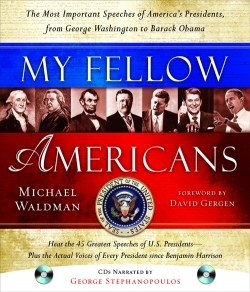My Fellow Americans
The Most Important Speeches of America's Presidents, from George Washington to Barack Obama
Before about 1900, American presidents rarely spoke directly to the public, and doing so was considered to be in such bad taste that one of the articles of impeachment against Andrew Johnson accused him of going on a speaking tour. It was a long way from there to FDR’s fireside chats. My Fellow Americans, a chronological survey of landmark presidential addresses, brings the development of the medium into sharp focus.
The broad sweep of this project forces Michael Waldman, the director of speech writing for President Clinton from 1995–1999, to skip many administrations altogether. The book is billed as “The Most Important Speeches of America’s Presidents,” and it would be difficult to dispute the importance of any of the addresses included here. Making them more vital and dramatic are two accompanying audio CDs that feature excerpts from recorded speeches, linked with narration by George Stephanopoulos.
Waldman provides historical context and background regarding the drafting of the speeches in introductions that precede the text of each. We learn that in FDR’s address to Congress after the attack on Pearl Harbor, he wrote that December 7, 1941 was “a date which will live in world history.” By the time he delivered the speech the next day, he had changed the line to the more powerful “a date which will live in infamy.”
The sea-change in the national position on such issues as the United States’ role in international affairs emerges as distinctly as the vision and rhetorical style of each of the presidents. We witness the transformation from the extreme isolationism advocated in George Washington’s farewell address to the radically interventionist policy of preemptive war, as put forward in George W. Bush’s address on Iraq. Similarly, the discourse on the perennial issue of race changes as conditions and attitudes evolve. Abraham Lincoln underscored the fact that agreement regarding slavery was essential to keeping the Union from splintering in a characteristically succinct address to the State Republican Convention in 1858. One hundred and fifty years later, in his 2008 speech in Philadelphia, Barack Obama pointed to his status as a frontrunner candidate from a mixed-race background as an example of what is possible in the egalitarian environment of the United States.
Photographs and boxed commentary from modern presidents on the importance of speeches by their predecessors give the book the format (and heft) of a textbook. But My Fellow Americans provides a contextualized overview of the presidential address that would be compelling to anyone interested in the history of the American presidency.
Reviewed by
Justin Courter
Disclosure: This article is not an endorsement, but a review. The publisher of this book provided free copies of the book to have their book reviewed by a professional reviewer. No fee was paid by the publisher for this review. Foreword Reviews only recommends books that we love. Foreword Magazine, Inc. is disclosing this in accordance with the Federal Trade Commission’s 16 CFR, Part 255.

